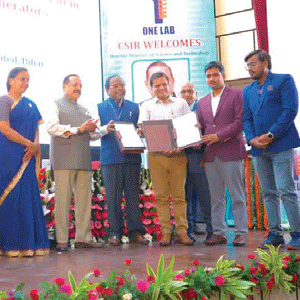
The transition from a linear to a circular economy highlights the importance of waste-toresource conversion, which is crucial for India's goal of becoming a trillion-dollar economy by 2035. In response, Ecosafe Zero Waste Solutions promotes composting as the most effective method for converting organic waste into valuable, nutrient-rich compost. The organization believes recycling, reusing, and reducing are vital for fostering healthy soils, clean air and water, a stable climate, and a sustainable society.

Anil Gupta, Partner
Ecosafe has been actively involved in states such as Jharkhand, Bihar, Uttar Pradesh, and Bengal, providing expert guidance on implementing the Solid Waste Management Rules, 2016. Their experience has helped these states develop effective waste management strategies and policies. "The company collaborates with government agencies and research institutions like CSIRCMERI in Durgapur to develop and implement advanced waste management technologies. A key focus of our efforts is developing zero-waste technology, which aims to maximize waste-toresource conversion", says Anil Gupta
Transforming Waste to Wealth
Ecosafe expertise extends to water and wastewater management, with projects encompassing the development of ecological parks, sewage treatment plants, effluent treatment plants, and common effluent treatment plants. Additionally, organization services offer a comprehensive range of solutions and follow a four-step process of solid waste management (2016 rules). The first step involves developing a collection system with source segregation into dry and wet waste. The second step is transportation, and the third is processing, with options like composting for wet waste and biomethanation for larger quantities to produce gas. In India, the high costs of converting dry waste into energy limit this option, leading to a focus on biogas and CNG instead. Plastic waste is recycled, while inert waste is sent to landfills.
"The fourth step is disposal, where four percent of inert waste, such as thin plastics, can be used as fuel, reducing reliance on coal. This approach aims to achieve zero waste by minimizing landfill use. CMERI's zero-waste campus demonstrates this concept, and as a commercial partner, we have acquired a license to sell this technology directly to PSUs", adds Anil.
Ecosafe has developed technologies to convert organic waste into CNG and CBG gases, recycle plastic waste for carbon neutrality, and transform residual waste into RDF for use in cement factories and thermal plants. To tackle sustainability challenges, organizations offer comprehensive operation and maintenance services. They ensure the efficient establishment and maintenance of waste management facilities by partnering with government entities. "We deliver nine advanced waste management solutions by establishing facilities to convert organic waste into biogas, implementing recycling systems, developing zero-waste technologies, and so on. Additionally, the organization supports employment and skills training programs, advancing waste management practices in India and setting a benchmark for other developing countries", shares Anil.
Ecosafe's key focus is developing zero-waste technology, to maximize waste-to-resource conversion
The organization was established after years of working with the government, focuses on women-led sanitation and skill development, has trained 500-600 people, with 500 securing jobs, and aims to train 5,000 more in Bihar by 2025. With a target turnover of Rs.50 crore INR by 2025 and aspirations to reach Rs.100 crore in five years, the company is expanding nationally and internationally, with demand in countries like Nepal, Bhutan, and the Maldives. Ecosafe collaborates with PSUs and is developing projects with SAIL and NTPC, expecting completion by 2026. The workforce is 50 percent women, with 44 percent from rural areas.
"We receive funding from the PMO, Swachh Bharat, CSR, and EPR funds to support initiatives, including plastic recycling and zero-waste technologies. Unlike other companies, we tailor solutions to fit clients' budgets, ensuring sustainable growth and technological advancement", concludes Anil.
We use cookies to ensure you get the best experience on our website. Read more...